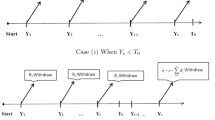Abstract
In Classical Bayesian approach, estimation of lifetime data usually is dealing with precise information. However, in real world, some informations about an underlying system might be imprecise and represented in the form of vague quantities. In these situations, we need to generalize classical methods to vague environment for studying and analyzing the systems of interest. In this paper, we propose the Bayesian estimation of failure rate and mean time to failure based on vague set theory in the case of complete and censored data sets. To employ the Bayesian approach, model parameters are assumed to be vague random variables with vague prior distributions. This approach will be used to induce the vague Bayes estimate of failure rate and mean time to failure by introducing and applying a theorem called “Resolution Identity” for vague sets. In order to evaluate the membership degrees of vague Bayesian estimate for these quantities, a computational procedure is investigated. In the proposed method, the original problem is transformed into a nonlinear programming problem which is then divided into eight subproblems to simplifying computations.

Similar content being viewed by others
References
Attanassov K (1986) Intuitionistic fuzzy sets. Fuzzy Sets Syst 20:87–96
Chang JR, Chang KH, Liao SH, Cheng CH (2006) The reliability of general vague fault–tree analysis on weapon systems fault diagnosis. Soft Comput 10:531–542
Chen SM (2003) Analyzing fuzzy system reliability using vague set theory. Int J Appl Sci Eng 1:82–88
Gau WL, Buehrer DJ (1993) Vague sets. IEEE Trans Syst Man Cybern 23:610–614
Huang ZH, Zuo JM, Sun QZ (2006) Bayesian reliability analysis for fuzzy lifetime data. Fuzzy Sets Syst 157:1674–1686
Kumar A, Yada PS, Kumar S (2007) Fuzzy system reliability analysis using \(T_{w}\) (the weakest t-norm) based arithmetic operations on L-R type interval valued vague sets. Int J Qual Reliab Manag 24:846–860
Kumar A, Yada PS, Kumar S (2006) Fuzzy reliability of a marine power plant using interval valued vague sets. Int J Appl Sci Eng 4:71–82
Puri ML, Ralescu DA (1986) Fuzzy random variables. J Math Anal Appl 114:409–422
Shao J (2003) Matematical statistics, 2nd edn. Springer, Berlin
Shu HM, Cheng HC, Chang RJ (2006) Using intuitionstic fuzzy sets for fault-tree analysis on printed circuit board assembly. Microelectron Reliab 46:2139–2148
Taheri SM (2003) Trends in fuzzy statistics. Austrian J Stat 32:239–257
Taheri SM, Behboodian J (2001) A Bayesian approach to fuzzy hypotheses testing. Fuzzy Sets Syst 123:39–48
Taheri SM, Zarei R (2010) Bayesian system reliability assessment under the vague environment. Appl Soft Comput 11:1614–1622
Taheri SM, Zarei R (2007) Bayesian reliability in vague environment. In: Proceedings of 56th session of the international statistical inistitue (ISI), Lisboa, pp 2080–2084
Viertl R (2009) On reliability estimation based on fuzzy lifetime data. J Stat Plan Inf 139:1750–1755
Viertl R, Hule H (1991) On Bayes’ theorem for fuzzy data. Stat Papers 32:115–122
Viertl R, Gurker W (1995) Reliability estimation based on fuzzy lifetime data. In: Onisawa T, Kacprzyk J (eds) Reliability and safety analysis under fuzziness. Physica Verlag, Heidelberg, pp 163–168
Wu HC (2004) Fuzzy Bayesian estimation on lifetime data. Comput Stat 19:613–633
Wu HC (2003) The fuzzy estimators of fuzzy parameters based on fuzzy random variables. Eur J Oper Res 146:101–114
Zadeh LA (1965) Fuzzy sets. Inform Control 8:338–353
Zimmermann HJ (2006) Fuzzy set theory and its applications, 4nd edn. Springer, Berlin
Acknowledgments
The authors would like to thank the referees for their careful reading of the manuscript and for many valuable suggestions which improved the presentation of the paper.
Author information
Authors and Affiliations
Corresponding author
Additional information
An erratum to this article can be found at http://dx.doi.org/10.1007/s00500-011-0747-7
Rights and permissions
About this article
Cite this article
Zarei, R., Amini, M., Taheri, S.M. et al. Bayesian estimation based on vague lifetime data. Soft Comput 16, 165–174 (2012). https://doi.org/10.1007/s00500-011-0731-2
Published:
Issue Date:
DOI: https://doi.org/10.1007/s00500-011-0731-2



